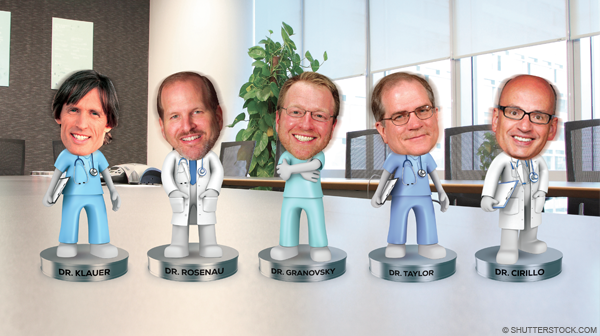
[/fullbar]
Explore This Issue
ACEP Now: Vol 33 – No 01 – January 2014Dr. Klauer: Tony, just for the readers, give us a one- or two-liner defining disproportionate share.
Dr. Cirillo: The Disproportionate Share Program, or DSH, is a program that essentially provides federal dollars to help offset the cost of care provided by hospitals to patients who are self-pay or “indigent.” Each state receives a payment annually, and then the states decide how to divvy up those funds among their hospitals by some formula that the feds have created to determine the dollar amount.
Dr. Granovsky: To build on that, if you are in a non-Medicaid-expansion state, you are losing, as Tony said, your DSH payment. Those payments support, in part, resident-driven or public-facing free clinics or indigent-care health-care access. So now you didn’t expand Medicaid if you’re in a Gulf state, let’s say Texas, Louisiana, or Mississippi. And the resources, the revenues that the hospital uses to fund its indigent care have now dried up. Where do those patients go? They only have one place left: the front door of the hospital’s emergency department.
Dr. Taylor: Just to add to that discussion, patients in this gap are exempt from the mandate based upon their income. So you create a situation where you don’t provide Medicaid to them and they don’t have the individual mandate.
If the good news about the Affordable Care Act is that in half the states we can look forward to more Medicaid patients, then I think that fairly well summarizes what we can expect for emergency medicine in this initiative.
Dr. Klauer: Thank you for that ray of sunshine, Todd. So how will the ACA impact reimbursement—short-term and long-term? Mike?
Dr. Granovsky: Medicaid will expand over time. The Massachusetts experience was that it took three to five years until everybody who could be insured would be insured. The movement into the health insurance exchanges will also take time, and it seems like the federal government is backing off of that by delaying the employer mandate by a year. And I agree with Tony: I think a lot of that will then lead to reconfiguring of the workforce to below the mandated 30-hour cutoff that requires employers to have coverage.
As more and more patients move into the exchanges, we will see ED reimbursement for the higher-end commercial plans driven down closer to Medicare levels.
Dr. Klauer: So is this model sustainable, Tony?
Dr. Cirillo: The answer, to me, is no. The fundamental reasons why we spend money on people haven’t changed. So we haven’t had any discussion, and I will fault the medical specialty for not doing this. Ten years ago, we could have had a discussion, honestly, with the people whom we refer to as “The Greatest Generation,” who understood the concept of self-sacrifice for the greater good. We could have had a discussion about, hey, let’s really talk about what people really want for health care as they get older and what should we really tell them about what it’s like to go to the cardiac cath lab at 90 and go to the ICU.




2 Responses to “What Will Obamacare Mean for Emergency Physicians?”
January 12, 2014
jpedmdRe. Dr. Klauer’s comment “So when it comes down to it, this is a shell game. You’re still paying $11,000 before anybody pays one penny of coverage for your family.”
This is just wrong, especially for the example cited – a family of 4, presumably with 2 children and 2 adults. Remember there is substantive free preventative care mandated under the ACA that is often the predominant type of care needed for young healthy families. See:
https://www.healthcare.gov/what-are-my-preventive-care-benefits/
May 27, 2015
Pennsylvania Governor Acts to Ensure Federal Health Care Subsidies - ACEP Now[…] Pennsylvania Governor Tom Wolf said on Friday the state will set up its own health care exchange if needed to save insurance subsidies for thousands of residents under the federal government’s 2010 Affordable Care Act. […]